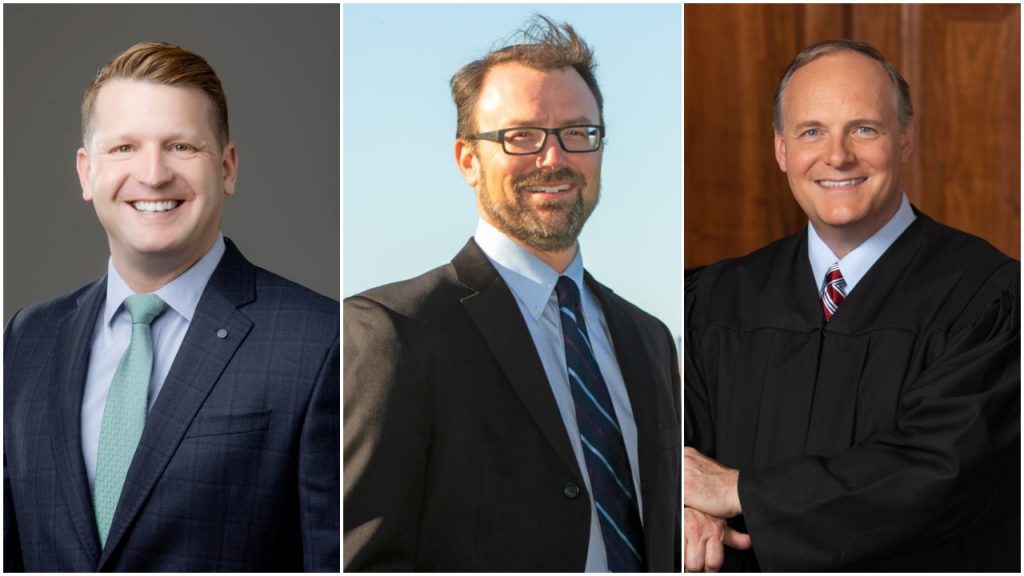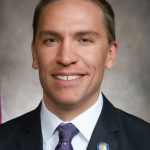Q&A With Circuit Court Candidates Part Two
Blomme, Dedinsky and Whitney make their case for election to Branch 5. Part Two

Left to Right, Brett Blomme, Zach Whitney, Hon. Paul Dedinsky.
This is part two of a two-part series. Read part one.
Three candidates in the race for the Milwaukee County Circuit Court Branch 5 bench will compete in the Feb. 18 primary. The top two finishers will advance to the April 7 general election.
The three are challenger Brett Blomme, incumbent Paul C. Dedinsky, and challenger Zach Whitney.
Blomme is president and CEO of Milwaukee-based Cream City Foundation. He graduated from Marquette University and earned his law degree from the University of Missouri. He formerly was employed by the State Public Defender’s Office and the Madison city attorney’s office. His resume is here.
Dedinsky was appointed to the bench in December 2018 by former Gov. Scott Walker. He spent more than 20 years as a Milwaukee County assistant district attorney, then accepted a job as chief legal counsel to the Wisconsin Department of Agriculture, Trade and Consumer Protection. He received his undergraduate degree from Creighton University in Omaha, Nebraska; a Ph.D. from Cardinal Stritch University; and his JD from the University of Wisconsin Law School. His resume is here.
Whitney is a shareholder at Kohner, Mann & Kailas. Before that, he spent eight years as an assistant district attorney. At Kohner, Whitney has numerous practice areas, including employment and labor law for businesses, bankruptcy, and appeals. He received his law degree from Marquette University Law Schooland his bachelor’s in Hanover College in Hanover, Indiana. His resume is here.
WJI asked each candidate to answer a series of questions. The questionnaire was patterned after job applications used by Walker and Gov. Tony Evers when they are considering judicial appointments. The answers here are as the candidates submitted them except where the candidate did not stick to the 500-word limit for each answer. The answers were edited for length and is noted.
Describe the two most significant cases in which you were involved as either an attorney or a judicial officer.
Blomme: State v. Bunch – Rock County Case #13CF706 — Mr. Bunch was Charged with 2 counts of Armed Robbery. He and his co-defendant set up Facebook ads to sell a computer and then robbed the victims, threatening the use of a weapon. I was the defense attorney in the case, representing Mr. Bunch.
State v. Young – Rock County Case #13CF477 & 13CF1311 – Mr. Young was charged with multiple Class C felonies. I was the defense attorney on the case, representing Mr. Young.
Dedinsky: (Note: I am unable to share cases from the Children’s Court Center due to confidentiality concerns.)
The case of State v. Hoeller (2006CF1715 & 2006CM4548) originally surfaced as a disorderly conduct charge. We transformed the investigation into felony stalking charges, representing one of the first uses of the revised felony stalking statute by our office. The evidence encompassed a range of stalking of the victim at home and work. The stalker threatened violence towards the victim and her family members, utilizing a variety of means to stalk her: Property damage, the internet, text messaging, e-mail, phone calls, voicemail messages, and manipulation of their child. This case entailed leadership during the investigative stages, patience with the victim and her family, an understanding of stalker typology research and power/control dynamics, and an ability to effectively assess the lethality of the stalker in order to plan the victim’s future safety. After preparing a powerpoint for courtroom presentation during discovery / pre-trial strategy, the defendant pled guilty and was sentenced to prison. For many years, the powerpoint presentation has been used to train law enforcement in stalking and domestic abuse relationship dynamics.
State v. York, 2001CF938. In 2002, I charged two parents with approximately 29 counts of child sexual abuse to their 8-year old daughter, drug manufacturing, possession of electric weapons, causing mental harm to a child, and possession of child pornography. The case involved lots of additional investigation and many complex legal challenges from lawyers relating to issues such as the legality of the search warrant and the defendant’s statement/confession law.
State v. Tyler, 2000CF003013. In 2001, I prosecuted a predator with a resume including: former youth counselor at a boys’ residential treatment center (Louisiana, 1970’s), recipient of a PhD in Counseling/Psychology where he served as a church minister and boy scout troop leader (Missouri & Illinois, 1980’s), a college professor (Texas, early 1990’s), and an underprivileged minority youth counselor at the Medical College of Wisconsin and University of Wisconsin-Milwaukee (mid-1990’s to 2001). After over 100 phone calls and many hours of investigation, I secured the cooperation of several male sexual assault victims from the 1970s, 1980s, and 1990s, whose patterns of victimization by the defendant were remarkably similar. Following the trial court’s approval of this compelling “other acts” evidence, the defendant pled guilty to his first felony sexual assault.
A SUCCESS STORY IN A CIVIL CONTEXT. In private practice in 1996, I successfully defended a father through a 3-day Termination of Parental Rights jury trial with many complicated factual and legal issues, as well as a complicated trial strategy. I persuaded the jury to correctly decide the case in favor of the father, who had markedly turned around his life and closely bonded with his children. After the jury trial, an experienced prosecutor who observed the jury trial approached me and asked me if I would be willing to apply to the Milwaukee District Attorney’s office. Shortly thereafter, I decided to apply and was offered a position.
Whitney: State v. Thames, 366 Wis. 2d 807, 874 N.W.2d 346 (Ct. App. 2015) (unpublished). As a Milwaukee County Assistant District Attorney, I directed and a multi-agency investigation into an elaborate homicide conspiracy. The case centered on the efforts of a major narcotics dealer to kill one of the State’s witnesses against him. The primary defendant engaged other members of his drug distribution network in the conspiracy through coded messages he sent from jail via telephone and US mail. This was one of many cases I prosecuted where witnesses’ lives depended on the legal outcome; if the primary defendant were found not guilty, extreme violence would be inevitable. Investigating law enforcement officers were concerned for the safety of witnesses and themselves. Our efforts were successful; seven co-conspirators were convicted of various offenses including the primary defendant, who was found guilty by a jury of conspiracy to commit first degree intentional homicide, possession with intent to deliver large quantities of heroin and cocaine, and multiple firearms offenses.
State v. Prescott, 2012 WI App 136, 345 Wis. 2d 313, 825 N.W.2d 515. While I prosecuted many shootings as an Assistant District Attorney, this one is very memorable. The victim was a 12 year old from St. Louis who was visiting her aunt in Milwaukee. She was enjoying a warm summer night in July with various family members on her aunt’s porch when, inexplicably, she was shot three times, including once in her chest. The defendant apparently mistook her aunt’s house for another house he intended to target, believing it belonging to a rival gang member. The evidence was slim at first. After another prosecutor declined to issue charges, MPD reassigned the case to two detectives familiar with the neighborhood. I was assigned to prosecute the offense if and when there was sufficient evidence to support a conviction. For months I worked closely with the detectives gathering evidence, securing the testimony of defendant’s fellow gang members, and amassing forensic and demonstrative evidence. The jury ultimately convicted the defendant for shooting the child. As for the child, by the time of the trial she had fully recovered from her wounds physically. It brought all of us who worked on the case great joy seeing her physically healthy and, by all outward signs, going about her life as a typical 13 year old (her age at the time of trial). To this day, however, I am deeply concerned about the ongoing effects to her phycological wellbeing likely caused by the trauma. There are, unfortunately, far too many people in our community traumatized by violence.
Describe your legal experience as an advocate in criminal litigation, civil litigation, and administrative proceedings.
Blomme: My most recent experience was my service as an Assistant City Attorney for the City of Madison. In this role, I prosecuted violations of the City’s ordinance code and traffic violations. I represented the City in court trials, jury trials, pre-trial conferences, and motion hearings. I also served as an Assistant State Public Defender in varies counties across Wisconsin. I represented indigent criminal defendants, juveniles subject to CHIPS or delinquency and individuals facing revocation of probation and/or extended supervision. Through this experience I gained extensive experience representing clients at courtroom hearings including several jury trials and court trials.
Dedinsky: Response edited for length.
PRIVATE PRACTICE: CIVIL AND CRIMINAL LITIGATION EXPERIENCE. Prior to joining the Milwaukee District Attorney’s office in January 1997, I worked in private practice from June 1993-January 1997, representing clients in a range of general practice civil matters, including approximately 10 family law divorce cases, 20 civil injunction matters, 15 personal injury cases, many small claims cases, and a few administrative law matters in front of administrative law judges. I represented defendants in approximately 250 criminal defense matters (adult and juvenile), and litigated approximately 10 court and jury trials during this time. I routinely handled probation/parole revocation matters in state and federal court.
TRIAL EXPERIENCE. As a prosecutor for just over twenty years, I reviewed thousands of police-referred investigations, charged criminal and civil matters, and litigated thousands of misdemeanor, drunk driving, delinquency, civil CHIPS, domestic violence, and sexual assault cases in front of circuit court judges, handling these cases from charging to sentencing/disposition. I personally litigated over 100 court trials and over 50 jury trials, with most of the prosecution cases being of a victim-centered nature.
ADMINISTRATION/MANAGE-MENT EXPERIENCE. Besides litigating civil CHIPS and criminal cases as an Assistant District Attorney, I also supervised a unit of prosecutors. In serving as the director of the Domestic Violence Unit for five and a half years, I helped to develop and draft policy for domestic violence issues for the Milwaukee District Attorney. I lent my legal opinion as to the application of legal authority to my office’s case work and the obligations under Wisconsin’s domestic abuse statutes. I testified before the state legislature concerning proposed legislation. I advised the production of new legislation for domestic abuse issues, joining with a statewide effort to draft language for legislation related to revising the state’s stalking statute and to thwart strangulation attacks. I served on the Milwaukee Police Department Family Violence Unit Planning Committee (2002-2003) to re-write the Standard Operating Procedures (SOP) of the Milwaukee Police Department. The multidisciplinary committee included advocacy groups/citizens from the greater Milwaukee community interested in promoting victim safety. Out of this effort, a specialized Family Violence Unit was established within the Milwaukee Police Department to expend greater resources in the investigation of domestic violence. With the new policies and procedures in place, I trained the entire Milwaukee Police Department – as well as Milwaukee County suburban officers – with a collaborative team of police officers and victim advocates.
ADMINISTRATIVE LAW EXPERIENCE. From May 2017 to December 2018, I served as the chief legal counsel for the state Department of Agriculture, Trade and Consumer Protection (DATCP). A very new legal practice area of governmental regulatory work was introduced to me. While the job of a state agency attorney concerned a broad spectrum of largely transactional legal work (e.g. administrative rule-making, rule drafting, employment and human resources, contracts, public records and open meetings law, and ethics), the many years of experiences in litigation were enormously useful, which I relied upon when considering issues and administrative law cases in particular.
Whitney: For eight years (2004-2012) I practiced in criminal litigation as a Milwaukee County Assistant District Attorney. My time in the District Attorney’s Office was primarily divided between prosecuting domestic violence and gun violence.
For the last eight years (2012-2020) I have practiced in civil litigation at Kohner, Mann & Kailas, S.C., where I am currently a shareholder. My practice largely involves commercial disputes between business. I represent clients in both federal and state court. I appear most frequently in Milwaukee County Circuit Court, followed by the courts of nearby counties. Last year, for example, I presented trials in Waukesha and Jefferson Counties.
As a Law Clerk for the Seventh Circuit Court of Appeals I gained experienced with administrative proceedings. In that capacity, I assisted with the Court’s review of administrative decisions, such as direct appeals from the Board of Immigration Review, which at the time comprised a surprisingly large share of the Court’s docket.
Have you ever been convicted of a crime, either misdemeanor or felony? If so, explain. When did the incident(s) occur?
Blomme: N/A
Dedinsky: No.
Whitney: I plead guilty to the misdemeanor crime of consuming alcohol under the legal age (I was 20 years old at the time of the offense) in Delaware Municipal Court in Delaware, Ohio, on October 17, 1994, case no 94CRB01359. I was fined $200 and was taxed costs of an additional $65, which makes it, by far, the most expensive Blatz beer I ever consumed.
Have you ever been cited for a municipal offense? If so, explain. When did the incident(s) occur?
Blomme: N/A
Dedinsky: Yes. Traffic violations (non-OWI-related).
Whitney: No.
Do you support requiring any justice to recuse him/herself from cases involving donors and indirect supporters who contribute money or other resources to the judge’s election? If not, why not? If so, why? What contribution limits would you set?
Blomme: As judge, I will adhere to the recusal standard in SCR 60.04(4) and will evaluate each circumstance on a case by case basis. I am not in a position to answer such a hypothetical question. It is certainly possible that I will have a person bias towards a donor to my campaign that will affect my ability to be impartial. Should this come up, I will evaluate the specific circumstances.
Dedinsky: Wisconsin Supreme Court Rule 60.04(7) and associated comment addresses the question: “A judge shall not be required to recuse himself or herself in a proceeding based solely on any endorsement or the judge’s campaign committee’s receipt of a lawful campaign contribution, including a campaign contribution from an individual or entity involved in the proceeding.” However, where impartiality is concerned, recusal is permitted when “The judge has a personal bias or prejudice concerning a party or a party’s lawyer or personal knowledge of disputed evidentiary facts concerning the proceeding.” WI SCR 60.04(4)(a).
Were the law to change, I would definitely follow it. However, even without a change to the law, if I were to harbor a personal bias for whatever reason, then I would recuse myself from the matter. For example, during my first year serving as a judge, I recused myself from over 30 cases where my name appeared in the docket as having appeared on them, even cases I had no memory of. I also recused myself from a dozen cases where my treasurer represented a party because I wished to follow the dictates of WI SCR 60.02 which lauds: “A judge should participate in establishing, maintaining and enforcing high standards of conduct and shall personally observe those standards so that the integrity and independence of the judiciary will be preserved.”
The law further requires judges not to be “swayed by partisan interests, public clamor or fear of criticism.” WI SCR 60.04(1)(b). “A judge shall perform judicial duties without bias or prejudice. A judge may not, in the performance of judicial duties, by words or conduct, manifest bias or prejudice, including bias or prejudice based upon race, gender, religion, national origin, disability, age, sexual orientation or socioeconomic status, and may not knowingly permit staff, court officials and others subject to the judge’s direction and control to do so.” WI SCR 60.04(1)(e).
Whitney: Yes, recusal should be mandatory under the law. There can be no true justice in our system when the system is perceived as being rigged by conflicts of interest or corruption.
One thing that needs to change is the rule that judicial candidates cannot directly solicit (ask with their own voice) funds for their campaign. The rule may sound good on paper because it gives the illusion that the candidates are not seeking money, which would inhibit their decision making in the future. In practice, however, the rule is silly because all campaigns need money.
If money is being solicited, it should be the candidate asking directly, in their own words and their own voice, to make it clear that they are requesting a political contribution to attain elected office.
The real limit on contributions should be from dark money organizations, not individuals. Especially regarding the Wisconsin Supreme Court, candidates should not be legally allowed to accept money from political action committees where the identities of the true contributors are not disclosed. United States Supreme Court precedent does not prohibit such a rule, even under the Court’s expansive interpretation of free speech.
Any judge, and any justice, should have the integrity to recuse themselves when there is a conflict of interest. If a party standing before them did not give money, but their spouse did, that’s enough for a conflict to exist.
This is not merely an issue of integrity and justice; it is what’s good for our democracy. We cannot sit idly by and watch our institutions erode. We have to take action to reinforce them and make them stronger. Our rules, like any house we build, eventually begin to decay. It’s up to us to fix them and make them stronger than they were before.
What are the greatest obstacles judges face when trying to deliver true justice? What can or should be done about them?
Blomme: The biggest obstacle to delivering true justice is the tendency of the judiciary to become insulated and disconnected from the community. As a judge, I will be committed to staying connected to all parts of our community by attending community meetings and continually educating myself on the good work of our non-profit partners whose work corresponds with the work of the criminal justice system. As judge, I will not be afraid to stand in the hot kitchen and take the heat for unpopular, but correct, decisions. We need to stop making decisions in our criminal justice system based on fear and start using facts.
Dedinsky: Response edited for length. WE NEED CRIMINAL JUSTICE INNOVATION IN OUR SERVICES, TREATMENT, AND CORRECTIONAL PROGRAMS. Too often, we experience youth who return after probation with new criminal offenses. We see youth offenders graduate into the adult criminal justice system. We see adult offenders with long criminal histories. We need proactive interventions that lift people from poverty, address mental health issues, and support change and transformation in their lives.
For my 20+ years of service in the Milwaukee District Attorney’s office, I served in a variety of positions. The hallmark of my service is that I welcomed and sought improvements. Perhaps the three most innovative positions involved my service as:
(1) Sexual Assault/Child Abuse Prosecutor (1999-2001) & Director of the Domestic Violence Unit of the Milwaukee District Attorney’s office (2001-2007);
2) Restorative Justice Assistant District Attorney for Milwaukee Public Schools (2008-2013); and
(3) Team Captain of the Family Drug Treatment Court (2014-2016), a court for substance abuse CHIPS parents seeking treatment for addiction. In all of these positions, I pursued improvements and reform.
As the Domestic Violence Unit director, I sought improvements by championing training for police, advocates, and prosecutors locally and nationally (see attached resume and list of presentations). I trained an entire in-service of MPD officers, personally doing 78 presentations over an 8-week stretch of time. Focusing on “evidence-based” investigation/prosecution techniques, I gained valuable skills in teaching law enforcement officers and prosecutors about stalking, strangulation, Crawford v. Washington confrontation clause challenges, and victim intimidation/ manipulation. I also trained Wisconsin Department of Corrections probation and parole agents to better understand their role in supervising domestic abuse offenders.
I sought reform and improvements to how police investigations are handled in Milwaukee County. For example, I served on the Milwaukee Police Department Family Violence Unit Planning Committee (2002- 2003) to re-write the Standard Operating Procedures (SOP) of the Milwaukee Police Department. Out of this effort, a specialized Family Violence Unit was established within the Milwaukee Police Department to expend greater resources in the investigation of domestic violence. I trained the entire Milwaukee Police Department – as well as Milwaukee County suburban officers at MATC South for the MATC Police Training Academy – with a collaborative team of police officers and victim advocates. Finally, I orchestrated a $1 million dollar appropriation for domestic violence in Milwaukee County and wrote an additional $1.4 million dollar VAWA grant for Milwaukee County which established the first re-entry victim advocate in MSDF and 3 victim advocates in MPD police districts for the very first time.
In the future, our criminal justice system needs to continue to face tough issues such as mass incarceration, racial disparities in incarceration, and improved systems of support for children and families in Milwaukee. Already, I am injecting restorative approaches and practices into our work at the Milwaukee Vel R. Phillips Juvenile Justice Center. I am advocating for improved services for delinquent youth and their families. Based upon my work in the Family Drug Treatment Court, I support Milwaukee County’s efforts to secure a mental health treatment court.
Whitney: A judge’s reach is limited. Judges cannot correct the ills of society and cannot change the hardships the person before them has faced, which are almost certainly intertwined with why the person is before the court. Judges need to see beyond the offense, and to the person. Everyone has good and bad moments, and all humans are prone to mistakes. The people who find themselves before a judge in criminal court are generally at a low point in their lives. This truth needs to be recognized when fashioning sentences. While also respecting victims’ rights and ensuring the safety of our communities, judges need to see that the person who stands before the court today likely has, with the proper resources, the capacity to be a productive member of our community tomorrow.
Describe any other information you feel would be helpful.
Blomme: I have dedicated my career to giving a voice to the voiceless and advocating for may marginalized communities. I am running for Milwaukee County Circuit Court because Milwaukee deserves to have someone that represents the diverse values of our community. I am running for Judge because nothing in our broken justice system will change unless we change who we elect as judges.
Dedinsky: COMMITMENT TO MILWAUKEE. I want our Milwaukee community to become the best version of itself. I love Milwaukee. I am the only current judge / judicial candidate who was born and raised here. I was born at St. Joseph’s hospital in 1967 and raised throughout my childhood in Milwaukee. In my early years, I was educated at Richards public school, St. Monica’s grade school, and Marquette high school. When I attended UW-Madison for law school and Creighton University for undergrad, Milwaukee remained my permanent address during these first 30 years of my life.
My mom, Mary Alice Dedinsky, worked at MATC on a full and part-time basis over a span of roughly 32 years, while my dad, Henry Dedinsky, worked for the city of Milwaukee (MMSD) for 42 years.
In 1997, I embarked on a 20+ year career as an Assistant District Attorney in the Milwaukee County District Attorney’s office where I prosecuted sexual assaults, child abuse cases, juvenile cases, and directed the domestic violence unit of the Milwaukee District Attorney’s office during which time I served on the City of Milwaukee’s Commission on Domestic Violence and Sexual Assault (2001-2007).
From 2008-2013, I co-located at MPS Central Office and served as a Restorative Justice Coordinator for MPS schools. From 2014-2016, I served as the Milwaukee District Attorney’s Team Captain for the Family Drug Treatment Court at the Vel R. Phillips Juvenile Justice Center. Whether I served at the Vel R. Phillips Juvenile Justice Center, the Milwaukee County courthouse, the Safety Building and CJF, Milwaukee City Hall as a commissioner on the City Health Department’s Commission on Domestic Violence and Sexual Assault (2001-2007), or MPS Schools and MPS Central Office… no other current candidate for judicial office in any race can boast 23 years of public service and a comparable level of commitment to bringing about positive social change and justice to our Milwaukee community.
Whitney: N/A
Gretchen Schuldt writes a blog for Wisconsin Justice Initiative, whose mission is “To improve the quality of justice in Wisconsin by educating the public about legal issues and encouraging civic engagement in and debate about the judicial system and its operation






















Thanks for publishing these interviews, it’s really good information for folks (like me) who are figuring out who to support.